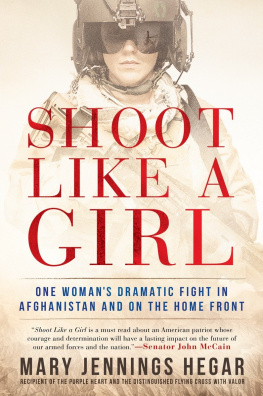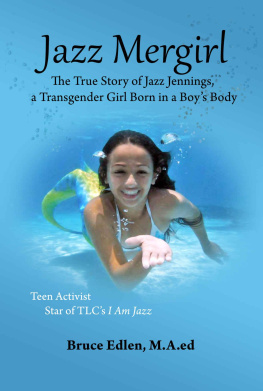PHILOMEL BOOKS
An imprint of Penguin Random House LLC, New York

First published in the United States of America by Philomel, an imprint of Penguin Random House LLC, 2020.
This work is based on Shoot Like a Girl:One Womans Dramatic Fight in Afghanistan and on the Home Front, by Mary Jennings Hegar, copyright 2017 by Mary Jennings Hegar, published by Berkley, an imprint of Penguin Random House LLC.
Copyright 2020 by Mary Jennings Hegar.
Penguin supports copyright. Copyright fuels creativity, encourages diverse voices, promotes free speech, and creates a vibrant culture. Thank you for buying an authorized edition of this book and for complying with copyright laws by not reproducing, scanning, or distributing any part of it in any form without permission. You are supporting writers and allowing Penguin to continue to publish books for every reader.
Philomel Books is a registered trademark of Penguin Random House LLC.
Visit us online at penguinrandomhouse.com
Library of Congress Cataloging-in-Publication Data is available
Ebook ISBN 9780593117774
Edited by Jill Santopolo.
pid_prh_5.5.0_c0_r1
To my soul mate and the love of my life, Brandon.
Weve each had our disasters and triumphs,
and theyve made us who we are today.
I wouldnt have it any other way.
Im so happy I found you, and I cant wait to see whats next.
Thanks for killing all of my spiders
but still pretending Im the brave one.
Youre so much more than I deserve.
For Jude and Daniel...
I love you big as the sky, and all your little bones.
Mommy loves you all the way to the moon and back again.
AUTHORS NOTE
It has been incredibly difficult to recount some of the events in this book. Many of them are hard enough to talk about with a close friend, let alone write about for anyone and everyone to read. Im putting it all out there for the world to see, and its terrifying. But many people dont know what Air Force Rescue does or that the Air Force even has helicopters. Many people dont know about the enormous contribution of the Air National Guard. Many dont think that there are women serving in combat roles. Others think that the women who do serve in combat shrink in fear when the bullets fly. I know differently, and I wanted you to know, too.
That said, there are security concerns associated with sharing the real names of some individuals still serving. On a couple of occasions, there are some who are perhaps not painted in the best light. For these reasons, some of the names have been changed. The Department of Defense has redacted a few key names and words (covered in black throughout the book). None of the stories have been dramatized, all of the accounts have been scrutinized by the Department of Defense for classified information, and they are relayed here exactly as I remember them. Most of these stories have been vetted by others who were there to ensure accuracy, but people do tend to remember some of the details differently. There were heroic feats of valor and questionable decisions throughout, but for the most part, we all did the best we could with the information we had in the fog of war. Without Monday-morning quarterbacking, what follows is my best attempt to tell our story as seen through my eyes and validated by my comrades in arms.
Go as a pilgrim and seek out danger
far from the comfort
and the well-lit avenues of life.
Pit your every soul against the unknown
and seek stimulation in the comfort of the brave.
Experience cold, hunger, heat and thirst
and survive to see
another challenge
and another dawn.
Only then will you be at peace
with yourself
and be able to know and to say,
I look down the farthest side of the mountain,
fulfilled and understanding all,
and truly content that
I lived a full life and one
that was my own choice.
JAMES ELROY FLECKER ,
FROM THE POEM PLAY HASSAN
PROLOGUE
I glanced out the window at the dark shadows of sharks just under the surface of the sea. Shaking my head, I willed myself to focus on the task at hand as I continued running through the checklist: checking my equipment, reviewing where the emergency release was on the door, miming unbuckling the seat harness and unplugging my comm cord, checking to make sure that the tiny oxygen bottle on my vest was charged and on. The bottle would provide about thirty seconds of air if we found ourselves plummeting to the bottom of the ocean. I was well aware of what to expect if we should have to ditch, as I had attended the thorough dunker training in Alabama, where you were strapped into a mock helicopter, shaken, plummeted into a pool, and flipped upside down. But out here in the ocean, there were no instructors standing ready to save you if you went under. There were no sharks in dunker training.
My summer had been filled with exciting missions: putting out wildfires in California, marijuana eradication from the vast national forests out west, and deploying to Texas for hurricane support. But my least favorite kind of mission would be the grand finale to that exhausting summer: a long-range overwater rescue mission. A fisherman on a freighter way out in the middle of the Pacific had been injured, so my crew and I had been dispatched to go pick him up and bring him to safety.
Years earlier, during my first assignment in the Air Force, I remember clearly sitting in a movie theater watching The Perfect Storm when the film came out. I had cringed, barely able to watch, as the crew on the rescue helicopter realized they were unable to refuel off of their airborne tanker to make it to dry land. When they ditched into the ocean, I thought to myself, Whew... I really want to be a pilot, but Ill never put myself inthatsituation. Youd have to be crazy to fly a helicopter out into the middle of the ocean!
Yet eight years later, there I was. Flying the same exact helicopter I had seen in the movie, out over the open ocean, unable to refuel, and looking for a shark-free place to ditch. Just my luck.
We launched out of San Diego in the morning, but we packed our night-vision goggles for the trip home. According to our mission-planning session the night before, we knew that wed be hitting the tanker for the fourth time after nightfall. We packed some sandwiches and water for the trip, but I wondered if Id even be able to eat, given the situation. Plus, I knew Id need to nearly dehydrate myself to avoid having to tackle the complicated dance of trying to urinate in the helicopter. The guys just needed to keep an empty bottle handy, but for me there would be a bit more work involved.


















